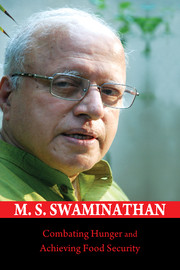Book contents
- Frontmatter
- Contents
- Foreword
- Preface
- Acknowledgements
- Abbreviations
- 1 Genesis and Growth of the Yield Revolution in Wheat
- 2 Our Agricultural Heritage
- 3 Shaping Our Agricultural Destiny
- 4 Thrust on Farm Revival
- 5 Nutri-farm Movement
- 6 Nutrition-sensitive Agriculture
- 7 Food Losses and Food Waste
- 8 Rice in Zero Hunger Challenge
- 9 Monsoon Management
- 10 Importance of Ecological Conservation
- 11 Caring for Ecology and Heritage
- 12 Conserving Biodiversity
- 13 Overcoming Hidden Hunger through Aquaculture
- 14 Biofuels – The Way to Go
- 15 Food Security
- 16 Vigilance for Sustainable Food Security
- 17 Food Security and Social Protection
- 18 Food Security and its Role
- 19 Sustaining the Livestock Revolution
- 20 Challenges in the Year of Science
- 21 Agriculture and Humanism
- 22 Fostering the Science of Science Communication
- 23 Olympic Move for Saving Children
- 24 Youth: The Agents of Change
- 25 Role of Women in Agricultural Production
- 26 Know-how to Do-how
- 27 From Bengal Famine to Right to Food
- 28 Financial Institutions and Fighting Food Inflation
- 29 Public Good Research in Agriculture
- 30 The Future of Indian Agriculture
- Bibliography
9 - Monsoon Management
Published online by Cambridge University Press: 18 December 2015
- Frontmatter
- Contents
- Foreword
- Preface
- Acknowledgements
- Abbreviations
- 1 Genesis and Growth of the Yield Revolution in Wheat
- 2 Our Agricultural Heritage
- 3 Shaping Our Agricultural Destiny
- 4 Thrust on Farm Revival
- 5 Nutri-farm Movement
- 6 Nutrition-sensitive Agriculture
- 7 Food Losses and Food Waste
- 8 Rice in Zero Hunger Challenge
- 9 Monsoon Management
- 10 Importance of Ecological Conservation
- 11 Caring for Ecology and Heritage
- 12 Conserving Biodiversity
- 13 Overcoming Hidden Hunger through Aquaculture
- 14 Biofuels – The Way to Go
- 15 Food Security
- 16 Vigilance for Sustainable Food Security
- 17 Food Security and Social Protection
- 18 Food Security and its Role
- 19 Sustaining the Livestock Revolution
- 20 Challenges in the Year of Science
- 21 Agriculture and Humanism
- 22 Fostering the Science of Science Communication
- 23 Olympic Move for Saving Children
- 24 Youth: The Agents of Change
- 25 Role of Women in Agricultural Production
- 26 Know-how to Do-how
- 27 From Bengal Famine to Right to Food
- 28 Financial Institutions and Fighting Food Inflation
- 29 Public Good Research in Agriculture
- 30 The Future of Indian Agriculture
- Bibliography
Summary
The Indian Food Security Act represents the largest social protection measure against endemic hunger ever undertaken in human history. India has graduated from a ‘ship-to-mouth’ existence to a situation where right to food is being implemented with home-grown food. The other rights conferred over the past 10 years relate to information, education, work and ownership of land for tribal families and forest dwellers. These rights can be implemented through administrative actions and with the help of files. The right to food, however, falls under another category. It can be sustained only with the help of over 700 million farm men and women. To successfully implement the right to food, India has to turn its attention from files to farms.
The factors that have the greatest influence on a farmer's well-being are the monsoon and the market.
Market volatility is closely related to the excess or deficiency of rainfall. Going by past experience, drought in most parts of the country and floods in Assam are usual meteorological events of public and political concern during the month of July. The India Meteorological Department (IMD) classifies monsoon behaviour into five categories:
• deficient: less than 90 per cent (of long period average);
• below normal: 90–96 per cent;
• near normal: 96–104 per cent;
• above normal: 104–110 per cent; and
• excess: above 110 per cent.
Phenomena related to global warming and climate change are making accurate weather predictions difficult. Extreme weather events like drought and floods are becoming more unpredictable and also more frequent. The IMD has gained the capacity and equipment needed for making long-, medium- and short-term weather forecasts. IMD, in partnership with the state agriculture departments as well as fertilizer companies like Indian Farmers Fertiliser Cooperative Ltd. (IFFCO), is making local-level weather forecasts available to farmers. Advances in information communication technology have made it possible to send farm and fisher families short message service (SMS) messages on the likely weather behaviour in the short term. India's capacity to render timely and reliable advice to farmers on crop-weather relationship has increased enormously. Today, the Agromet Advisory Services cover the whole country. Crop weather watch groups provide timely advice to farmers on how to manage crops, both in rainfall-scarcity and rainfall-surplus conditions.
- Type
- Chapter
- Information
- Combating Hunger and Achieving Food Security , pp. 53 - 58Publisher: Cambridge University PressPrint publication year: 2016



